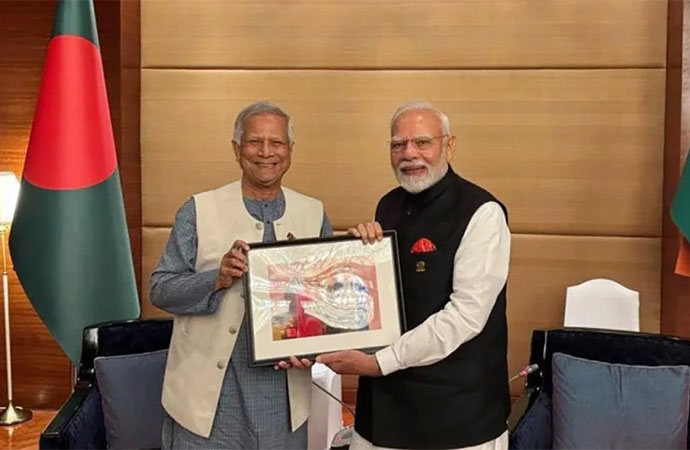Politics

Both leaders met on the sidelines of the BIMSTEC Summit in Bangkok. Photo: Facebook/Chief Adviser GOB
During a recent diplomatic engagement on the sidelines of the BIMSTEC Summit, Prime Minister Narendra Modi met with Bangladesh's head of the interim government, Muhammad Yunus, and reaffirmed India's steadfast support for a democratic, stable, peaceful, progressive, and inclusive Bangladesh. He emphasized the people-centric approach to bilateral relations, highlighting the two countries' long-standing cooperation that has delivered tangible benefits for both. In a message conveyed through Foreign Secretary Vikram Misri, the Prime Minister expressed India's desire to build a pragmatic and constructive relationship with Bangladesh. He also cautioned that rhetoric that vitiates the environment is best avoided, stressing the need for strict enforcement of border laws and the prevention of illegal crossings-especially at night-to uphold border stability and security.
Pragmatically speaking, developing closer strategic and geoeconomic ties with New Delhi is in Dhaka's long-term national interest. This is not only due to the geographical reality of sharing an approximately 4,100-kilometer border with India but also to the strategic, economic, and security advantages that closer cooperation with New Delhi can provide. Today, India's ascent on the global stage has made it a vital and attractive partner for countries around the world. In today's highly volatile global geopolitical environment, countries across Europe, the Middle East, East Asia, and beyond are actively seeking to engage with and strengthen their geoeconomic ties with New Delhi. Given India's current position in the international system, its rise as the world's fastest-growing major economy, and its positive, non-reciprocal role in its neighbourhood through developmental initiatives such as the 'Neighbourhood First' and 'SAGAR' (Security and Growth for All in the Region) policies, it is in Bangladesh's long-term interest to strengthen bilateral ties and capitalize on the opportunities that closer engagement with New Delhi may provide. Moreover, given India's expanding regional and global influence, it has become a vital partner for its immediate neighbours, particularly Bangladesh, whose economy is closely linked and intertwined with India's.
India has been a crucial development partner for Bangladesh, providing substantial financial assistance through grants, loans, and lines of credit over the years. In 2010, India extended its first line of credit (LoC) to Bangladesh, amounting to $1 billion. This was later restructured to include a $200 million grant and an $800 million concessional loan, which was subsequently increased to $862 million in 2015. By 2022, India's total concessional loans to Bangladesh had reached nearly $9.5 billion, reflecting New Delhi's non-reciprocal and generous economic support. In its budget for the fiscal year 2024-25, India allocated 120 crore (approximately $15 million) as development assistance to Bangladesh.
While past grievances, domestic politics, external factors, and domestic political narratives can sometimes complicate bilateral ties, foreign policy must be rooted in rational calculations rather than emotions. For both India and Bangladesh, concentrating on long-term strategic cooperation is preferable to allowing short-term political rhetoric to derail progress. Pragmatism, political will, and diplomatic maturity are essential to advancing mutual interests and addressing legitimate concerns.
Despite some differences-which are inevitable in any close relationship-the way ahead is forward-looking thinking and constructive engagement. Dhaka and New Delhi both together share the objectives of regional peace, stability, connectivity, and economic development. Trade, energy, infrastructure, and strategic cooperation between the two countries have historically shown promise for mutual benefit. It is imperative that both countries work to institutionalize collaboration and address differences through dialogue.
However, the promise of deeper cooperation must be balanced against evolving geopolitical realities that shape the strategic environment in which India and Bangladesh operate. China, with its longstanding geopolitical rivalry with New Delhi, has consistently sought to constrain India's rise-both globally and more acutely within its immediate neighbourhood. Beijing frequently seeks to use smaller countries in the region to undermine India's interests. In this scenario, Dhaka must avoid becoming a pawn in China's larger geopolitical chess game aimed at undermining India's territorial integrity and sovereignty. Additionally, there are reports in the media that Dhaka plans to establish a strategic base near the Chicken's Neck area with Beijing's assistance and has invited its investment to revitalize the airbase at Lalmonirhat, near India's Siliguri Corridor, further complicating the already fragile relationship and raising deep security concerns for India.
The Siliguri Corridor-a narrow stretch of land approximately 60 km long and 22 km wide that connects mainland India to its northeastern states-remains a strategic vulnerability. New Delhi is worried that any instability or strategic intrusion by a hostile actor in this region, including in neighbouring Bangladesh, could potentially jeopardize access to this vital corridor, thereby posing serious challenges to India's territorial connectivity, national security, and economic integration with the Northeast.
Dhaka must acknowledge that India's security worries are valid and well entrenched in history. For example, during the period of the Bangladesh Nationalist Party (BNP), India's northeast saw substantial turmoil as a result of the safe haven granted to insurgent groups operating across the border. Cross-border infiltration is a significant challenge, contributing to demographic shifts, resource constraints, and dangers to India's internal security. Furthermore, given past experiences and the history of Pakistan using third nations to create trouble in India, Dhaka's expanding security and defence cooperation with Islamabad is understandably causing greater unease in New Delhi.
This strategic unease is further heightened by the ongoing political instability in Bangladesh, which introduces an unpredictable element into an already fragile regional security environment. Yunus has postponed elections under the pretext of initiating reforms. However, without electoral legitimacy, such reforms are bound to be viewed with scepticism. Bangladesh's institutions have historically been weak, and strengthening them is a gradual process. If the country has struggled to build robust democratic institutions over the years, it is unrealistic to expect Yunus-who holds no democratic mandate-to achieve this in an interim capacity. Initially designated as a caretaker leader, Yunus now effectively administers the country beyond his provisional capacity, with elections continuously postponed. Even if he implements reforms in the judiciary, electoral processes, and various other areas, their long-term viability is doubtful. Enduring reforms require both legitimacy and popular approval, which Yunus lacks.
As political tensions develop, extreme groups strive to take advantage of the transition period to advance their own goals. Minority communities, notably Hindus, are becoming more vulnerable in this volatile environment. Nahid Islam, a prominent student leader and head of the newly formed National Citizens Party, recently asserted that free and fair elections are "impossible" under the current law-and-order situation. Adding to the gravity of the crisis, Bangladesh's Army Chief, General Waker-Uz-Zaman-who was instrumental in facilitating Prime Minister Hasina's exit and Yunus' ascension-warned that the country is in a "state of anarchy," and cautioned that if the unrest persists, "the independence and sovereignty of this country will be at stake.
While some observers are concerned about the erosion of democratic legitimacy, the route forward is inclusive political dialogue and respect for constitutional processes. Bangladesh's leaders will require wide domestic support to guide the country through its challenges and carry out the necessary reforms.
Conclusion
India-Bangladesh relations are today at a critical moment. While historical, cultural, and economic linkages provide a strong foundation for cooperation, shifting geopolitical realities and internal political instability in Bangladesh pose significant challenges to this relationship. India's sustained support for a democratic, inclusive, and stable Bangladesh demonstrates its long-standing commitment to regional peace and prosperity. However, Dhaka must act rationally, recognizing both the opportunities and responsibilities that come with its strategic location and bilateral ties. It must avoid taking acts that could jeopardize regional stability or India's genuine security concerns, such as increasing military cooperation with hostile nations or postponing democratic processes. In this context, the future trajectory of India-Bangladesh relations must be guided by pragmatism, mutual trust, and a shared vision for a peaceful and connected South Asia. Only through sustained dialogue, institutional cooperation, and political maturity can both nations navigate existing differences and secure a mutually beneficial future in an increasingly uncertain global environment.
Imran Khurshid is an Associate Research Fellow at the International Centre for Peace Studies (ICPS), New Delhi. He specializes in India-US relations, the Indo-Pacific studies, and South Asian security issues.

























Leave a Comment
Recent Posts
Right On Schedule
The most eagerly anticipated, and frankly hyped up, announcement of an ...
Fighting raged along the borde ...
Fighting raged along the border of Cambodia and Thailand, with explosi ...
ICIMOD drives regional cooperation to inspire new mo ..
The Cage of Captivity and the Cry for Freedom: A Cru ..
Why Japan issued an advisory for a possible megaquak ..
The Autocrats’ War on Universities